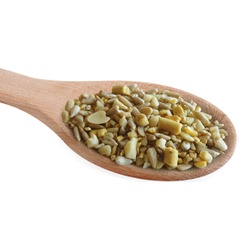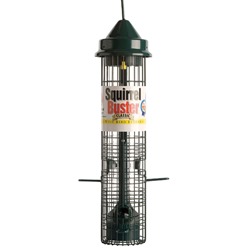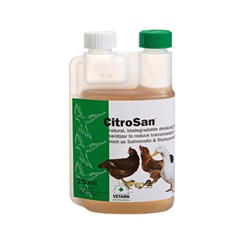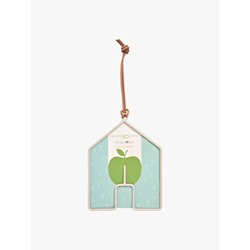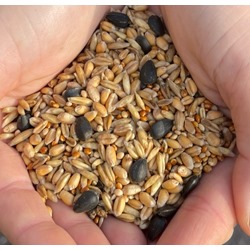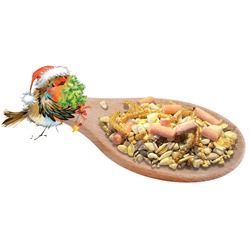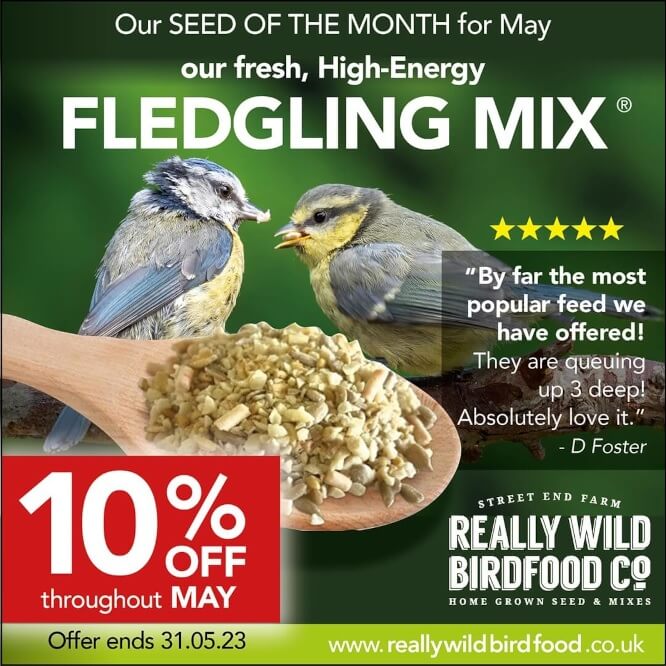
Feed your fledglings with the best quality food
Our High Energy Fledgling Mix™ is Available Now - Delicious and Wholesome
- the very best for fledglings
At a glance - reasons to try our High Energy Fledgling Mix™
- Mini pieces make easy feeding for fledglings and adults with little beaks
- Highly Digestible
- Ultra High Energy
- Won't grow or sprout - so no mess and everything will be eaten
- It is delicious!
SAVE 10% Here >>>
News From The Farm
Well at the risk of sounding like a moaning farmer's wife ( or is it the wife of a moaning farmer? ) this Spring has been a nightmare in terms of rain. Since the beginning of November we have had a year's worth of rain. Richard says it has been the most difficult Spring for 40 years with infrequent chances to do the farm work. Sowing our barley was touch and go, and he just finished sowing our beans last weekend - beans that normally would have gone in in mid March! So it has been a challenging time for us all, with almost everything out-with our control.
This time of year is incredibly busy with so much field work to do in terms of drilling the crops and then looking after them to prevent disease and attack by slugs and a huge array of different insects and parasites intent on feeding on young shoots and destroying young plants. There is always pressure to sow early in the year , so that young plants can put down roots into the soil which will make them better able to withstand drought in the summer months.
We also spend a lot of time looking at soil indices. It is important to make sure that the pH levels as well as phosphate and potash are correct for crop growing.
We have recently taken on some new land which will be used to grow millet for this season. We have just soil tested it and it is going to require quite a bit of work since the pH, potash and phosphate levels are all low, so that will be or first job to restore soil health before planting a bit later on this month.
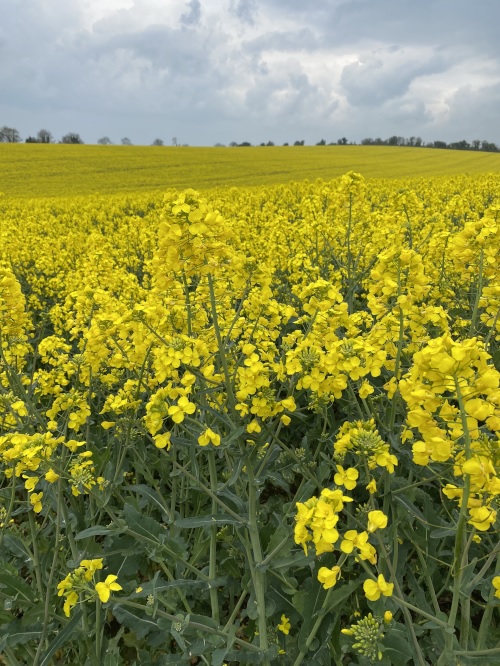
One crop that does look tremendous this year is our oil seed rape ( see picture above! ) If you follow my newsletters, you will know that we have had a couple of very tricky years with flea beetle destroying our rape crop. But this year it looks great, with abundant flowering and a wonderful scent. The flowers and the scent are hugely attractive to insects and bees and subsequently farm land bird numbers rise as they hone in on the insects that are working the rape. The Swallows are back and they are working the insects coming off the rape, and Linnets are also easily found in our hedgerows where they are nesting and feed their young with un-ripened rape seeds which are a greeny/brown colour but highly nutritious for young nestlings.

Drilling and Rolling
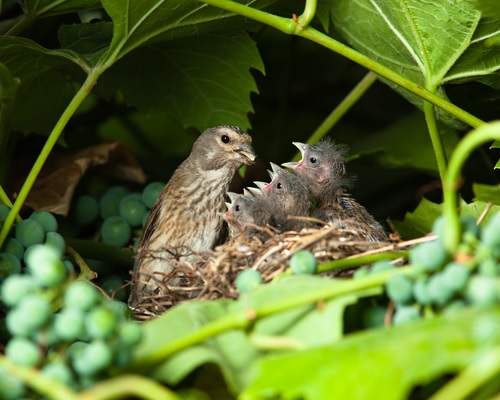
A hungry family of linnets
Some interesting facts about linnets
- The linnet is a small slim finch of the family, Fringillidae. It derives its common name and its scientific name, Linaria, from its fondness for hemp seeds and flax seeds
- Linnets used to be popular as caged birds because of their melodious song!
- The male Linnet ( seen below ) has an identifying red poll and breast.
- Linnets use a varied habitat including areas of scrub, wasteland, heath and urban areas. On farmland, they can be found wherever there is a plentiful supply of seeds
- Linnets and their chicks rely almost entirely on seeds throughout the year. Sunflower seeds in Autumn are a real favourite. During the winter, adults will favour stubbles and field margins where weed seed and split grains are abundant. Dandelion seeds in pasture are particularly important. Chicks feed on weed seeds and unripe oilseed rape grains.
- Linnets typically nest in thorn hedges. They are usually 0–2 metres up in thick, well-maintained thorn hedges, bramble patches and areas of scrub. Gorse bushes are a favoured nesting site.
- Sadly, Linnet numbers have dropped substantially over the past few decades, with the UK population estimated to have declined by 57 per cent between 1970 and 2014.
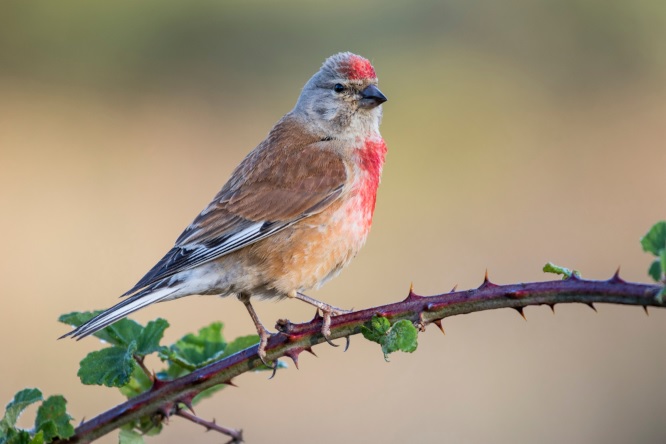
There are a number of things we do on our farm to support the wild bird population which includes Linnets.
As Linnets are particularly reliant on seeds, wild bird-seed crops are extremely beneficial and because we grow all our own wild bird seed crops - our farm is a great place for linnets. We also allow plenty of green cover to develop on over-wintered stubbles and we leave these un-disturbed for as long as possible in the Spring to provide continuous supply of food. Messy areas with rough grass and large bramble patches are also popular places for linnets to hang out.
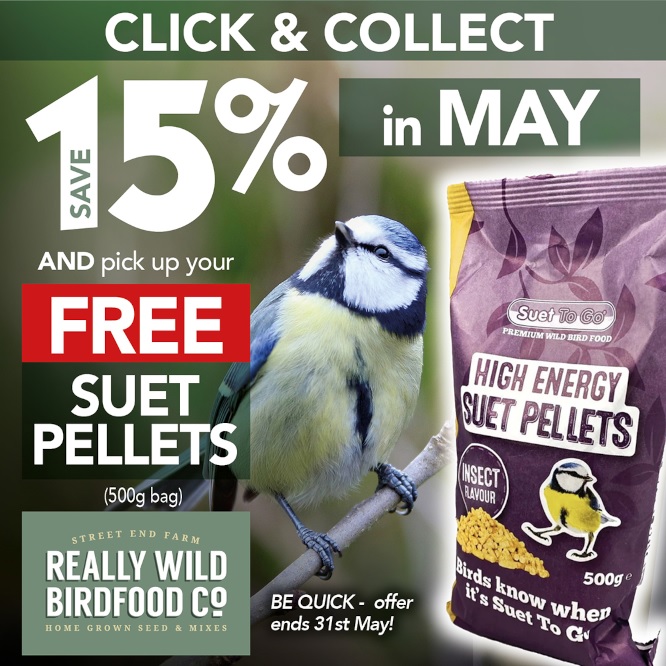
Due to the success of our Click and Collect Offer for April - we have decided to offer it again for May! So even more savings can be made - 15% off everything collected from the farm - plus a 500g bag of hi energy suet pellets FREE as a gift for your garden birds. We love meeting our customers - so do come and say hello. Just order online - select the click and collect option at checkout ( where the 15% discount will be applied ) and then collect at a time to suit you!
Shop Now >>>
And Finally...Happy Birthday Richard!
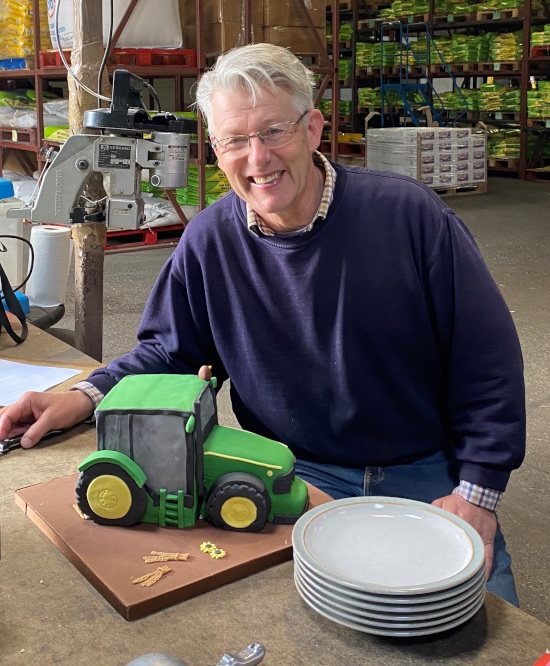
Richard celebrated a big birthday at the end of April and our lovely staff surprised him with a new John Deere tractor! Well - a John Deere of the edible kind… but what a lovely thought, and the cake tasted delicious. He is easing himself into the next decade.
Look after yourselves and your birds!
Best wishes
Lesley
 Bird Feeders
Bird Feeders  Seed Feeders
Seed Feeders Peanut Feeders
Peanut Feeders Peanut Butter Feeders
Peanut Butter Feeders Suet & Fat Feeders
Suet & Fat Feeders Window Feeders
Window Feeders Hanging Feeders
Hanging Feeders Feeding Stations
Feeding Stations Ground Feeders
Ground Feeders Easy Clean Feeders
Easy Clean Feeders Bird Tables
Bird Tables Seed Trays
Seed Trays Bird Baths & Drinkers
Bird Baths & Drinkers Feeder Accessories
Feeder Accessories Feeder Hygiene
Feeder Hygiene Squirrel Proof Bird Feeders
Squirrel Proof Bird Feeders For the Kids
For the Kids Niger Seed Feeders
Niger Seed Feeders Mealworm Feeders
Mealworm Feeders Bird Food Storage
Bird Food Storage Fat Ball Feeders
Fat Ball Feeders Tube Feeders
Tube Feeders













